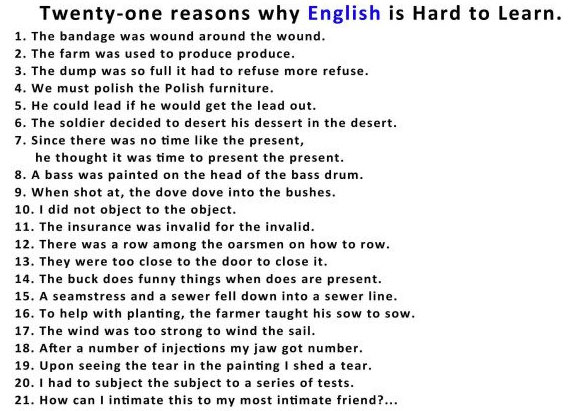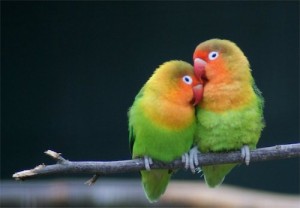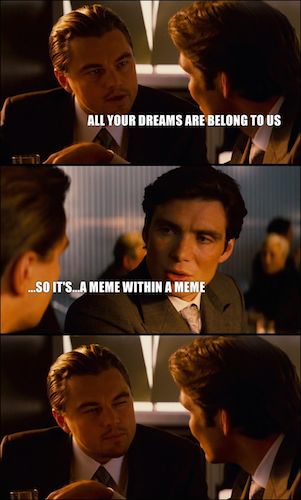by Naomi L. | July 22, 2015 | Blog, Creative Writing |
English is a funny language. One of my favorite quirks about it is the way words can be changed completely with just a simple alteration. Sometimes you can add or subtract one letter (as in “peas”, “pleas”, and “please”). Sometimes you can swap letters in a word (as in turning a “dog” into a “god”) or between words (as in turning a “barn door” into a “darn boor”). And sometimes, all it takes to alter a word is to change the way you say it. I don’t know about you, but I think that’s pretty neat.
So just for fun, here’s a list of 20 words that completely change in meaning when pronounced differently. Enjoy!
 1) Bass – A BAS is a type of freshwater fish. A BAYS is a sound, voice, or musical instrument of the lowest possible range.
1) Bass – A BAS is a type of freshwater fish. A BAYS is a sound, voice, or musical instrument of the lowest possible range.
2) Close – To be KLOHS is to be nearby. To KLOHZ is to shut something that’s open.
3) Content – To be kən-TENT is to be satisfied or peacefully happy. KAHN-tent is whatever is contained within something.
4) Defect – A DEE-fekt is a flaw or shortcoming. To di-FEKT is to switch sides in a conflict.
5) Desert – To də-ZƏRT is to abandon someone or something. A DE-zərt is a dry and barren area of land.
6) Dove – A DƏV is a type of seed- or fruit-eating bird. DOHV is the past tense of “dive”.
7) Entrance – An EN-trəns is an access point or the act of entering a place. To en-TRANS is to capture someone’s attention by filling them with wonder and delight.
8) Intimate – To be IN-tə-mit is to be closely acquainted and familiar with someone. To IN-tə-mayt is to imply or hint at something.
9) Invalid – An IN-və-lid is a person weakened by sickness or injury. To be in-VA-lid is to be void, untrue, or otherwise not valid.
10) Lead – To LEED is to show the way, to be in charge, or to be superior. LED is a type of soft metal.
11) Object – An AHB-jekt is a material thing. To əb-JEKT is to express disagreement or disapproval.
12) Polish – To be POH-lish is to be of or related to Poland. To PAH-lish is to rub the surface of something until it becomes smooth and shiny.
13) Present – To be PRE-zənt is to be in a particular place. A PRE-zənt is a gift; the PRE-zənt is the period of time happening now. To pri-ZENT is to give something to someone.
14) Project – A PRAH-jekt is an enterprise planned to achieve a particular goal. To prə-JEKT is to move or extend outward.
15) Refuse – To ri-FYOOZ is to express unwillingness to do something. RE-fyoos is matter discarded as trash.
16) Row – A ROH is a group of people or things in a straight line. To ROH is to propel a boat through water with oars. A ROW is a noisy quarrel.
17) Sow – To SOH is to plant seeds in the earth. A SOW is an adult female pig.
18) Tear – To TEHR is to rip something. A TEER is a drop of salty water secreted from the eyes.
19) Wind – WIND is the natural movement of air in the form of currents. To WYND is to move around something in a twisting or spiral course.
20) Wound – A WOOND is an injury typically involving cut or broken skin. WOWND is the past tense of “wind” (WYND).
What are your thoughts on these words? What other words would you add to this list?
by Naomi L. | May 6, 2015 | Blog, Creative Writing |
When it comes to writing romance, I tend to draw a lot from personal knowledge and experience. Though I have lived a few interesting stories of my own, the truth is that I learned most of what I know about love from my parents. They’ve been my inspiration for as long as I can remember, and they’re the reason I have so much faith in love today. My love stories feature healthy relationships and happy endings because that’s the reality I grew up witnessing every single day.
So what are the secrets to writing a love that’s true? Here are a few tips I learned from my parents that I love to implement as much in my stories as in my personal life. I hope you can learn some valuable lessons from them too! Enjoy!
1) The best kind of love blossoms from friendship.
 Anyone who has read at least a few of my romantic stories has no doubt noticed that most of the love I write grows between characters who start out as friends. My parents met well before they got together, and I think the reason they get along so well today is because they’ve known from the very beginning that they have enough in common to make things work. Not too much, of course, but that’s where the next piece of advice comes in…
Anyone who has read at least a few of my romantic stories has no doubt noticed that most of the love I write grows between characters who start out as friends. My parents met well before they got together, and I think the reason they get along so well today is because they’ve known from the very beginning that they have enough in common to make things work. Not too much, of course, but that’s where the next piece of advice comes in…
2) The key to everlasting love is mutual respect.
As alike as they seem sometimes, my parents are two very different people. My mom is soft-spoken and attentive, while my dad is loud and passionate. The key to their successful relationship is that they never try to impose elements of their personalities on each other, but rather appreciate each other’s strengths and accept their differences as the dynamic that keeps their marriage interesting. In other words, they avoid making that common married-couple mistake of trying to change each other. Not that they don’t learn from one another, of course, but when they do, it’s thanks to their intelligence and willingness to each be the best spouse the other deserves, which makes for a much healthier kind of relationship. They’ve become better people together not because they felt obligated to, but because they wanted to.
3) It’s important that you make each other laugh. Always.
When I think back on all the times I’ve noticed my parents interacting, I realize that I’ve heard them laugh much more often than I’ve heard them argue. Even when I’d overhear them getting upset about something, it would never take too long for one of them to say something silly that would start them both laughing about the whole thing. And I’m certain that’s what’s kept them together to this day. If I’ve learned anything from observing my parents’ relationship my whole life, it’s that love is only worth holding onto if it brings you much greater joy than sorrow. This may be the most important piece of advice my dad ever gave us: if you’re not laughing anymore, it’s time to jump ship.
4) Marry someone you love talking to.
Something else I’ve always noticed about my parents’ relationship is that they talk to each other about almost everything. Maybe it’s because they have similar yet distinct ways of thinking, so they’re usually interested in what the other has to say. Occasional difficulties in listening aside (mostly on my father’s part), my mom and dad have always been on the same page when it comes to communication. Of course, this made it nearly impossible for me and my sisters to get away with anything, but that just helped us to grow up as well-disciplined and happy children. That’s another important lesson we learned from our parents: to maintain a healthy relationship, communication is a must.
5) Learn to let the little things go and just enjoy life!
 This advice technically applies to anyone, but it’s especially important for committed couples. If you and your significant other get hung up on every little thing in your relationship that upsets you, you’re eventually going to drive each other crazy. That’s why my mom and dad never get stuck on minor issues for very long. When it comes to their arguments, they’re more about the “forgive and forget” philosophy, because they know that in the long run, those little spats are not worth stressing over. Instead, they focus on the important things, they support each other through thick and thin, and they make the most of each other’s company to just enjoy life. Can you really imagine a more perfect love than that?
This advice technically applies to anyone, but it’s especially important for committed couples. If you and your significant other get hung up on every little thing in your relationship that upsets you, you’re eventually going to drive each other crazy. That’s why my mom and dad never get stuck on minor issues for very long. When it comes to their arguments, they’re more about the “forgive and forget” philosophy, because they know that in the long run, those little spats are not worth stressing over. Instead, they focus on the important things, they support each other through thick and thin, and they make the most of each other’s company to just enjoy life. Can you really imagine a more perfect love than that?
These are the lessons about love that I’ve learned from my parents, and I’m grateful to them every day for the example they’ve set for my sisters and me. I only hope to experience a love like theirs throughout my life, but for now, I’ll keep using it as inspiration for my romantic fiction, as I hope you can too. Good luck! Thanks for reading!
Dedicated to my parents, the happiest couple I know. Thank you for teaching me what true love really is. Happy Anniversary, Mom and Dad! I love you!
by Naomi L. | April 8, 2015 | Blog, Creative Writing |
After starting a set of posts on the comparison between artistic and scientific writing, today I’d like to take a break to discuss a related topic that’s been on my mind for a while: science fiction. With all the brainstorming I’ve been doing regarding science and art, I figured now would be the best time to talk about why I love the intersection between the two so much. So on that note, here is a brief list of reasons why I love science fiction. Enjoy!
1) It reconciles my two great passions: science and art.
 As I’ve made all too clear by now, both science and art fascinate me immensely. I’m incredibly proud to be able to call myself a scientist and an artist, so their crossover area is basically my playground. It stands to reason, therefore, that science fiction is right up my alley. Combining elements of both worlds, sci-fi stories appeal to my artist side for the creative reimagining of our universe and to my scientist side for the exploration of the potential in real scientific theories. For someone like me who practically lives in this intersection, it doesn’t get much better than that.
As I’ve made all too clear by now, both science and art fascinate me immensely. I’m incredibly proud to be able to call myself a scientist and an artist, so their crossover area is basically my playground. It stands to reason, therefore, that science fiction is right up my alley. Combining elements of both worlds, sci-fi stories appeal to my artist side for the creative reimagining of our universe and to my scientist side for the exploration of the potential in real scientific theories. For someone like me who practically lives in this intersection, it doesn’t get much better than that.
2) It stimulates real scientific thinking.
One thing I notice whenever a major sci-fi movie comes out is a surge in discussions – both online and off – about how realistic it is. With films like Gravity and Interstellar comes a rise in articles and social media posts by actual scientists explaining the real workings of physics in outer space and pointing out the common inaccuracies in these movies. The same thing happens (albeit to a lesser degree) with stories about other scientific themes such as time travel, dystopian futures, robot uprisings and zombie apocalypses. And I, for one, love having those discussions with my friends and fellow academics. As a writer, I have nothing against a little artistic license, but as a biologist, I encourage the clarification of facts to make sure the truth isn’t buried too far beneath the fiction. As I like to think of it, ignorance is bliss, but knowledge is power.
3) It’s the ultimate “What if?”
I’m sure by now it’s only too obvious that “What if?” is my favorite type of writing-related question. I love imagining what sorts of stories could play out around a single major condition, and no genre can pique that curiosity like science fiction, because changing one detail means altering the entire universe as we know it. What if there’s intelligent life on other planets? What if computers had the intellectual capacity of humans? What if there were a virus that could turn people into zombies? Writing science fiction is like creating infinite parallel worlds with incredible possibilities, all with the power of our minds! How cool is that?
4) It unites people like no other genre can.
Some may not necessarily see this as a good thing, but I’ve always found it interesting how sci-fi has this indomitable power to bring people with similar interests together in a way that no other genre of fiction can. I make no secret of being a so-called nerd and proud of it, so knowing there are tons of people out there who also embrace that eccentric side of themselves is heartwarming. Science fiction offers a unique common ground for those of us who choose to occasionally forget this world and explore the possibilities contained within alternate realities. And if we can share that passion with each other, that makes our love of sci-fi all the more enjoyable.
5) It’s fun to indulge in!
For all the above reasons and more, science fiction is fun, as much to read and watch as to write. I love getting lost in alternate worlds, and sci-fi offers that escape in so many different flavors that I sometimes wonder how I manage to tear myself away from it long enough to face reality again. I could spend hours indulging in these fascinating stories, so if you appreciate science and art like I do, science fiction is definitely the genre for you! Enjoy!
What about you? Why do (or don’t) you like science fiction?
by Naomi L. | February 11, 2015 | Blog, Creative Writing |
Valentine’s Day is fast approaching, and what better way to acknowledge the most romantic day of the year than by discussing the theme of love in fiction? Romance has been a prevalent topic in fiction for centuries, so much so that even stories in other genres usually contain at least one romantic subplot. But what is it about romance that makes it so popular? I can’t speak for every romance enthusiast out there, but I can discuss why I personally consider it one of my favorite genres of fiction.
So to continue on the theme of Valentine’s Day, here’s a brief review of five reasons why I love romance. Enjoy!
1) I live vicariously through fictional characters… especially my own.
One of my favorite things about reading and writing fiction in general is that it gives me a chance to experience life through the eyes of another person. And sometimes all I really want is to see the many different sides of love. That’s where romance comes in. My favorite pieces to write have always been love stories because they give me the freedom to imagine how people with different personalities might face the challenges of romance and to experience the passion and dangers of love without facing any of the risks myself. And isn’t that one of the greatest thrills of being a writer?
2) Love stories inspire me to be a better person.
When I read or write stories about people who are happy when with each other or who would do anything for each other, it inspires me to pursue those positive traits in my own life. Even seeing love in real life makes me as happy as when I read about it in fiction, if not more. In my experience, love is something that helps us grow and become better people. This is reflected in the last romantic story I wrote, which was about two teenagers whose love brought out the best in each other. With all the wonderful qualities love can inspire in people, it’s no wonder I love to experience it myself!
3) Romance exposes the true nature of people (even if somewhat idealized).
It’s human nature to love and want to be loved. That’s one of the things that makes romance so relatable. That’s also one of the reasons I use it to learn more about human behavior in general. Being something of a social ingénue, I often take advantage of fiction as a mirror that reflects some of the qualities of real people. Of these, none are more raw or real than human emotion, and of all the forces in the world that can drive it, one of the most powerful by far is love. So if any genre of fiction can offer an insight into true human nature, it’s romance. Which is why…
4) Stories about love give me a positive outlook on the world.
More often than not, romance shows us the good side of people, a side I wish we could see more in real life. There are far too many tragic stories in the world as it is. So when I read or write about characters loving each other, it fills me with hope that the same could be true for real people. As I’ve noted in the previous items, fiction at least partially reflects reality in many ways. So if fictional characters can bring out the best in each other, why not believe that we can too?
5) Love never gets old!
If nothing else, I read and write love stories because I never get tired of them. Ever. I read romantic novels. I watch “lovey-dovey” movies. I write stories about people who fall and live and even die for each other. And still it never becomes cliché. Something about romance always calls me back to it, and likely always will. I can’t help it; I just love love!
So how about you? What are your favorite things about romance?
by Naomi L. | January 21, 2015 | Blog, Creative Writing |
I’ve already talked about words that people use incorrectly and words that used to have another definition. But what about those word meanings that are just plain wrong? Continuing on the topic of grammar pitfalls, here’s a new post focusing on words that people seem to think mean one thing but that really mean something totally different. To keep things light, I’m starting with four of my favorites, but please feel free to suggest more in the comments! Thanks, and enjoy!
Please note: accounts behind the words listed here are based entirely on personal experience and may not accurately reflect the majority of people’s understanding. The definitions, on the other hand, are correct to the best of my (and the Oxford Dictionaries editors’) knowledge. Read consciously! Thank you!
Inception means “beginning”, not “a dream within a dream”

Memeception?
Shortly after Inception came out in 2010, the Internet was flooded with jokes and memes based on the blockbuster sci-fi film, from captioned dialogues between Leonardo DiCaprio and Cillian Murphy to videos containing the trailer’s infamous “BRAAAM“. One of the most common jokes I’ve heard is to add the suffix -ception to any word to indicate that said thing is contained within another of the same thing (e.g. Jokeception = a joke within a joke). Apparently, the idea of multilayered dreams is such a prominent theme in the film that many believe it to be the major point of the plot. And while it isn’t fair to assume that all or even most people who use this meme don’t know what “inception” really means, there’s always that minority who aren’t even aware there’s a mistake until it’s pointed out to them.
So those of you who count yourselves among this group, take note: “inception” indicates the beginning of something, not a dream with a dream (or any X within an X, for that matter). Feel free to make all the jokes you want, but don’t let the memes confuse you!
Note: in case you were wondering, the actual word for “a thing within a thing” is “recursion”. The title of the movie is Inception because the main characters’ goal is to trigger the birth of an idea within someone’s mind. You’re welcome.
Star-crossed means “ill-fated”, not “soulmates”
When one hears the term “star-crossed”, the first idea to come to mind is most likely William Shakespeare’s Romeo & Juliet. This is to be expected; it is, after all, the play that originated the trope:
From forth the fatal loins of these two foes,
A pair of star cross’d lovers take their life,
Whose misadventur’d piteous overthrows
Doth with their death bury their parents’ strife.
(I.Prologue.5-8)
To anyone even remotely familiar with this story, it should be obvious from the opening sonnet that “star-crossed lovers” are those who struggle against fate. Romeo and Juliet do everything they can to live happily together, yet circumstances and bad luck lead them to a tragic end instead. However, some people seem to misinterpret “star-crossed” as having the opposite meaning, that is, a term for lovers who are destined to be together. It’s an understandable mistake, since hardly anyone can argue against the idea that the eponymous lovers are at least supposed to be together, but that doesn’t make it any less incorrect.
For future reference, “star-crossed” refers to a relationship doomed to be thwarted by external forces. Evidently coined by Shakespeare himself, the term stems from the old belief that the stars controlled fate, and thus the “crossing” of two people’s stars indicated misfortune in their path. Therefore, it should never be used to indicate that two people are soulmates, as it means just the opposite. Be careful!
Wherefore means “why”, not “where”
While we’re on the subject of Romeo & Juliet, here’s a word that everyone has misread at least once. The most famous line in the play comes up during Juliet’s balcony monologue, when Romeo eavesdrops on her musing, “O Romeo, Romeo! Wherefore art thou Romeo?” (II.ii.33)
For modern-day readers, it’s natural to read “wherefore” as a fancy “where”, and to assume that Juliet is wondering where her beloved Romeo has gone after the Capulet ball. However, “wherefore” actually comes from a Middle English phrase meaning “what for”, and should thus be read as “why”. This, of course, changes the entire meaning of the above line. Juliet is really saying “Why are you Romeo?”, as in she is lamenting the fact that he is a Montague. It may not mean what you thought it did, but the true definition of “wherefore” makes this line much more poetic, don’t you think?
Decimate means “reduce”, not “obliterate”
While it isn’t a common mistake, I’m almost certain I’ve heard someone use the word “decimate” incorrectly before, probably in a phrase along the lines of “completely decimated”. This is actually something of an oxymoron, as “decimate” refers to the destruction of a percentage of something, not the entire thing. Perhaps this incorrect use was simply a rare example, but just in case, it’s worth clearing up for future reference.
Historically, to “decimate” was to kill one in every ten of a group of people (generally soldiers) as punishment for the entire group. Nowadays, it usually means to destroy a large portion of something, but the historical evidence is still there in the Latin root deci-, which means “tenth”. In any case, it’s generally agreed that the word should not be used to mean “defeat utterly”, so take care with how you use it yourself!
Have you been reading any of these words incorrectly? What other words would you add to this list?
 1) Bass – A BAS is a type of freshwater fish. A BAYS is a sound, voice, or musical instrument of the lowest possible range.
1) Bass – A BAS is a type of freshwater fish. A BAYS is a sound, voice, or musical instrument of the lowest possible range.
 Anyone who has read at least a few of my romantic stories has no doubt noticed that most of the love I write grows between characters who start out as friends. My parents met well before they got together, and I think the reason they get along so well today is because they’ve known from the very beginning that they have enough in common to make things work. Not too much, of course, but that’s where the next piece of advice comes in…
Anyone who has read at least a few of my romantic stories has no doubt noticed that most of the love I write grows between characters who start out as friends. My parents met well before they got together, and I think the reason they get along so well today is because they’ve known from the very beginning that they have enough in common to make things work. Not too much, of course, but that’s where the next piece of advice comes in… This advice technically applies to anyone, but it’s especially important for committed couples. If you and your significant other get hung up on every little thing in your relationship that upsets you, you’re eventually going to drive each other crazy. That’s why my mom and dad never get stuck on minor issues for very long. When it comes to their arguments, they’re more about the “forgive and forget” philosophy, because they know that in the long run, those little spats are not worth stressing over. Instead, they focus on the important things, they support each other through thick and thin, and they make the most of each other’s company to just enjoy life. Can you really imagine a more perfect love than that?
This advice technically applies to anyone, but it’s especially important for committed couples. If you and your significant other get hung up on every little thing in your relationship that upsets you, you’re eventually going to drive each other crazy. That’s why my mom and dad never get stuck on minor issues for very long. When it comes to their arguments, they’re more about the “forgive and forget” philosophy, because they know that in the long run, those little spats are not worth stressing over. Instead, they focus on the important things, they support each other through thick and thin, and they make the most of each other’s company to just enjoy life. Can you really imagine a more perfect love than that? As I’ve made all too clear by now, both science and art fascinate me immensely. I’m incredibly proud to be able to call myself a scientist and an artist, so their crossover area is basically my playground. It stands to reason, therefore, that science fiction is right up my alley. Combining elements of both worlds, sci-fi stories appeal to my artist side for the creative reimagining of our universe and to my scientist side for the exploration of the potential in real scientific theories. For someone like me who practically lives in this intersection, it doesn’t get much better than that.
As I’ve made all too clear by now, both science and art fascinate me immensely. I’m incredibly proud to be able to call myself a scientist and an artist, so their crossover area is basically my playground. It stands to reason, therefore, that science fiction is right up my alley. Combining elements of both worlds, sci-fi stories appeal to my artist side for the creative reimagining of our universe and to my scientist side for the exploration of the potential in real scientific theories. For someone like me who practically lives in this intersection, it doesn’t get much better than that.



Recent Comments